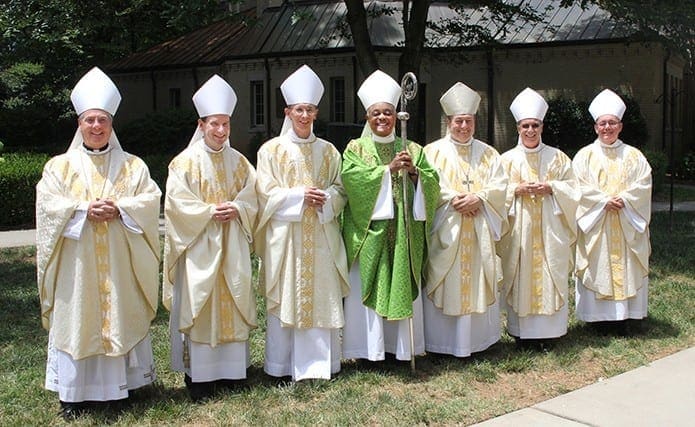 Photo By Patricia L. Guilfoyle
Photo By Patricia L. GuilfoyleCharlotte
Archbishop: Unconditional love is better path to peace
By PATRICIAL L. GUILFOYLE, Special to the Bulletin | Published July 9, 2015
CHARLOTTE, N.C.—The June 17 shooting at an historic church in Charleston, South Carolina, was still weighing on the hearts of the region’s Catholic bishops as they gathered in Charlotte June 22-23 for a previously scheduled meeting.
Seven of the bishops of the Atlanta Province—which encompasses the Archdiocese of Atlanta and the dioceses of Savannah, Georgia, Charleston, and Charlotte and Raleigh, North Carolina—concelebrated Mass at St. Patrick Cathedral June 23 before concluding their private meetings.
Bishops at the Mass were Atlanta Archbishop Wilton D. Gregory; Savannah Bishop Gregory J. Hartmayer, OFM Conv.; Raleigh Bishop Michael F. Burbidge; Charlotte Bishop Peter J. Jugis; Charleston Bishop Robert E. Guglielmone; and Atlanta auxiliary bishops, Bishop Luis R. Zarama and Bishop David P. Talley.
Prayers were offered for the repose of the souls of the nine victims of the shooting at Emanuel African Methodist Episcopal Church, and in his homily, Archbishop Gregory urged people to seek the path of peace through compassion and mercy.
There are two approaches to bringing peace between people who disagree or quarrel, the archbishop said, as described in the day’s reading from the Book of Genesis and the Gospel of Matthew.
In the first reading, Abram and Lot find peace by separating from each other: “Abram stayed in the land of Canaan, while Lot settled among the cities of the Plain.”
“That’s one approach to bringing peace,” Archbishop Gregory said. “But the better approach is the one from the Gospel,” in which Jesus tells his disciples: “Do to others whatever you would have them do to you.”
“In other words, the best way to approach peace is with compassion and mercy. It’s an important Gospel for us to listen to because our whole nation during this past week has been caught up with the results of the lack of peace, the lack of understanding, the lack of compassion, the lack of tolerance.”
“We could solve the problem by separating, being removed from each other, or we can solve the problem by learning how to love each other more compassionately,” he said.
“We’ve tried the first. Let’s try the second. It works better—by learning how to love one another unconditionally.”
Patricia L. Guilfoyle is editor of the Catholic News Herald, the newspaper of the Charlotte Diocese.